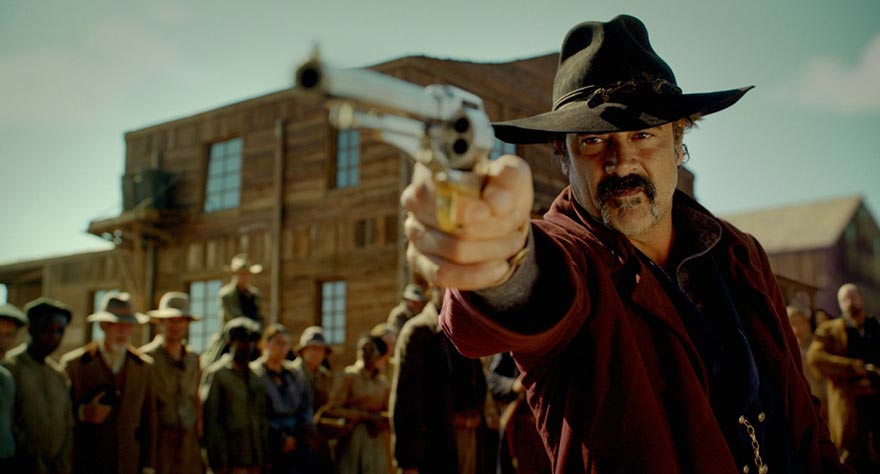
A perfect Western homage with less than perfect results.

A perfect Western homage with less than perfect results.
Kristian Levring’s The Salvation is a true Western. If a check-list exists around essentials of the genre, he’s surely read the list and checked it twice. Revenge, grit, the most evil of bad guys, dirt, shotguns, horses, and a body count that calls into question how early America was able to stay populated at all. Starring Mads Mikkelsen (The Hunt), Eva Green, and Jeffrey Dean Morgan, Levring’s film is a perfect throwback to the Westerns of old except that it can’t help but be swept up in its own modernity. The very act of using today’s bells and whistles to create such an homage piece invokes a sense of nostalgia but mostly distracts enough to cause the film to miss its mark. For all its action, bathetic conventions, and Mikkelsen’s perfectly edged face marked with old-world determination, The Salvation entertains but doesn’t inspire. It’s a reminder of all we love of Westerns, but lacking in the modern integrity we’ve come to expect.
Mikkelsen plays Jon, a Danish immigrant in late 19th century wild west America. He and his brother (Mikael Persbrandt) left their home country and their families to build fresh prospects and now, seven years later, Jon’s wife Marie (Nanna Øland Fabricius) and son Kresten (Toke Lars Bjarke) have traveled to join him. They aren’t reunited more than a few hours when the surly evil men of the wild west attempt to take advantage of Marie in the stage-coach. Jon scuffles with them but is thrown from the coach. By the time he catches up to them, he is too late, his family is dead. Jon manages to get the rifle of the men and kills them both. He makes plans to sell his land and leave, but he doesn’t realize he’s killed the brother of the baddest outlaw around, Delarue (Morgan).
Delarue marches into the town demanding penance for the murder of his brother. The Sheriff/town preacher Mallick (Douglas Henshall) isn’t able to meet Delarue’s demand that the killer be found in a matter of hours, so he takes his price, several of the innocent townspeople, including an elderly grandmother. It’s a brutal introduction to the film’s villain, but certainly leaves no doubt that Delarue is a painstakingly one-dimensional evil-driven mad man. Mallick eventually tracks Jon down, deciding that handing him over to Delarue will buy him some time until government reinforcements can help him out. Jon is strung up and left to die, his brother imprisoned. And then the action starts.
Eva Green is Madelaine, a mute whose tongue was cut out when she was captured by Native Americans. Delarue’s brother saved her and married her, no doubt without asking for her input. Delarue gladly takes his brother’s place as her caretaker and lover, but Madelaine plots her escape, unsuccessfully. Green is excellent in the role, her naturally icy stare making up for her utter lack of dialogue. Mikkelsen and Persbrandt kick ass, taking down Delarue’s henchman one by one as he enacts his revenge.
Levring’s close following of the laws of Westerns entertain at first, making it hard not to smile at their obviousness. Unfortunately, they are never able to make up for the more glaring holes in The Salvation. While Westerns are known for their lack of dialogue, Levring seems to have deliberately tried to create cookie-cutter characters, the most obvious of these being Jon and Delarue, the main characters. Jon has clear motivation (the murder of his family) but almost no depth otherwise. We know he was a soldier, but nothing of his personal conviction. But hey, he looks like a badass, and badasses do badass things. Delarue on the other hand might as well be a cartoon character from Rocky and Bullwinkle. Sure, he understands the significance of the “sticky oil” bursting out of the ground in the area, secretly buying up all the land to make a profit, but mostly he’s just a blood-driven fiend, shooting people rather than inciting any real fear or authority over them.
It’s easy to be swept away watching Jens Schlosser’s visuals, it’s a beautiful film; the production design executed to perfection by Jørgen Munk, and the era captured intricately by Diana Cilliers’ costumes. And although revenge is almost always sweet, The Salvation is so clearly using its Western facade to cover what is actually a brainless, bloody, action film that it leaves a more hollow feeling after its credits roll. Levring has talent and all the trappings, but any cowboy could tell him it isn’t the size of your gun, it’s how you use it.